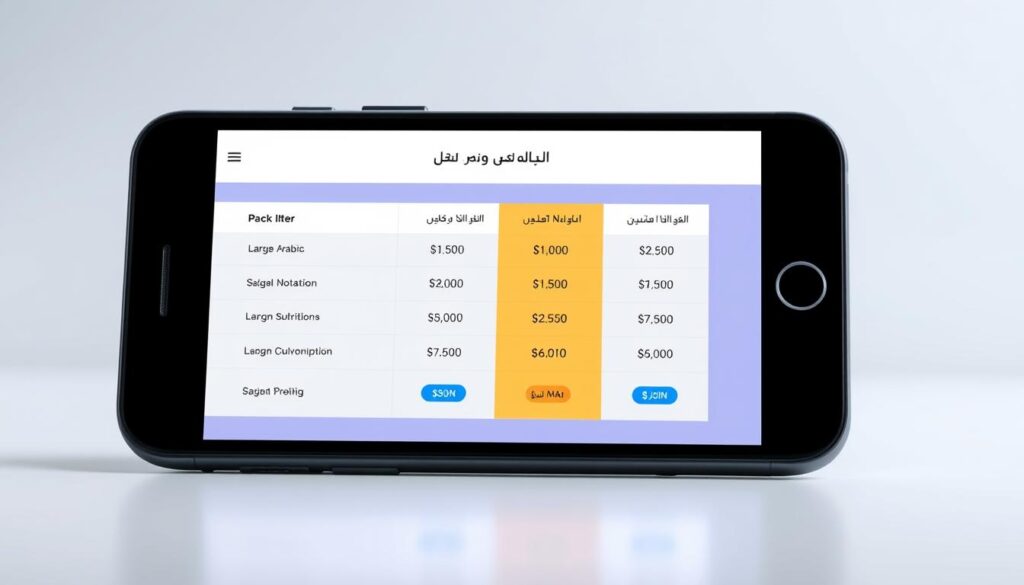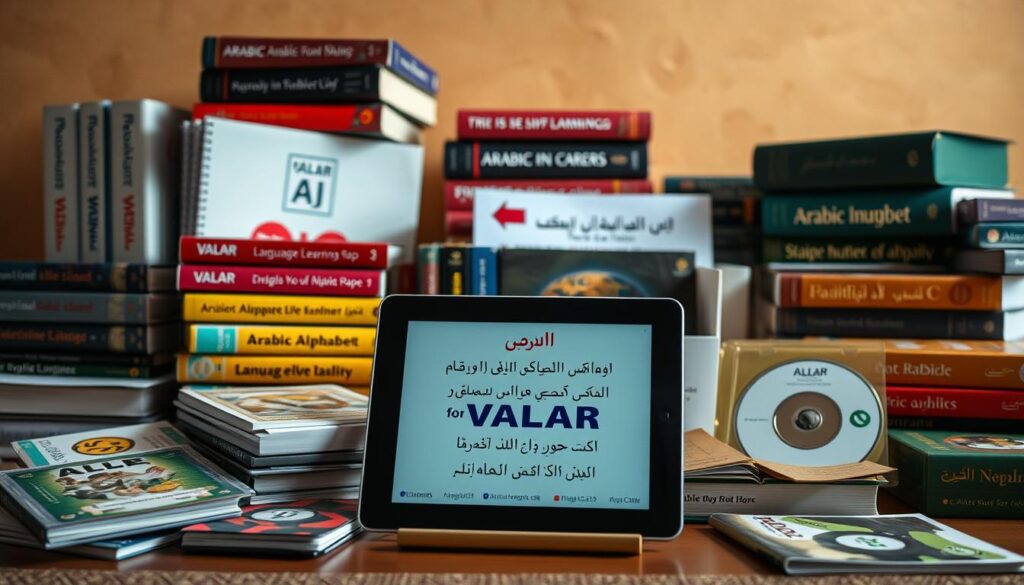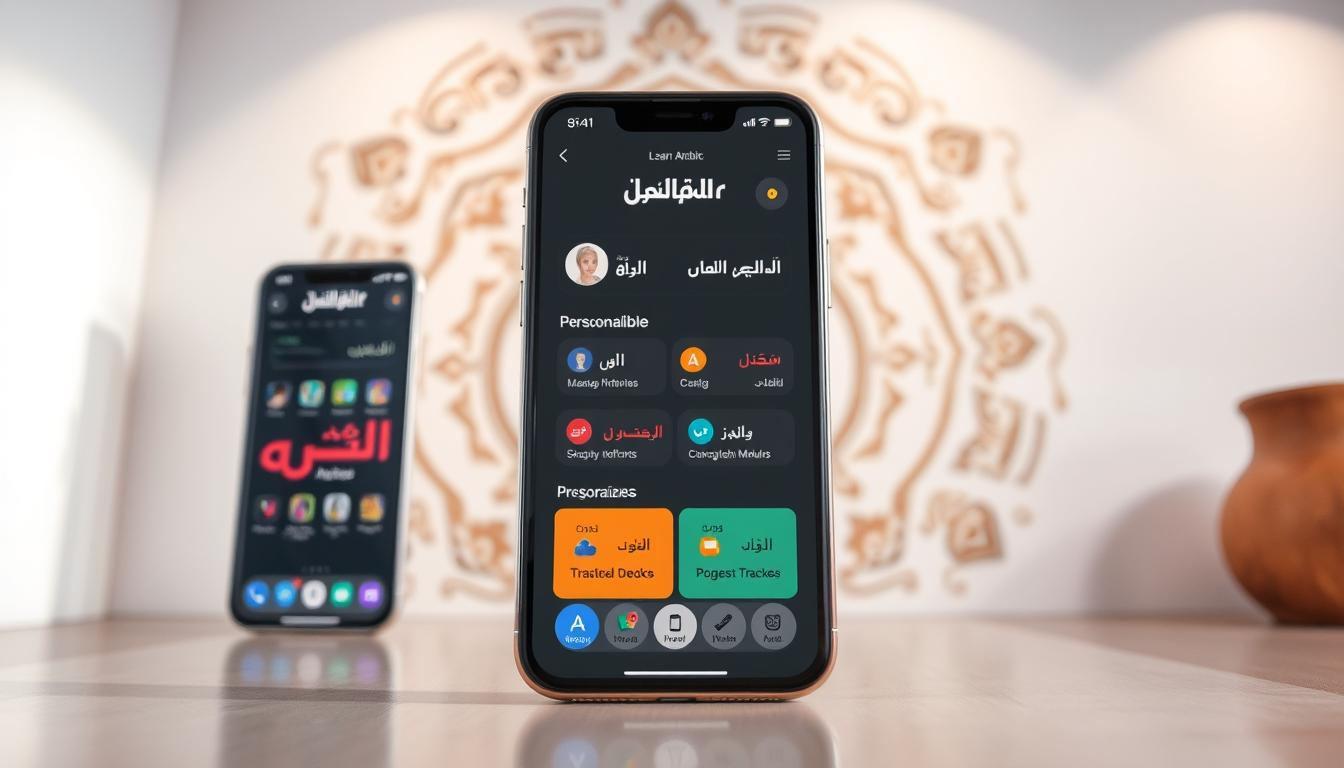Learning Arabic can be rewarding. Now, thanks to language learning apps, it’s easier than ever. In the United States, you can find many apps like Mango Languages, Drops, and Duolingo. These apps have interactive lessons, help build vocabulary, and use speech recognition technology.
Choosing the right app is key. With so many options, picking one can be tough. Duolingo is free, while Mango Languages requires a subscription. Drops uses spaced repetition but doesn’t cover grammar.
Introduction to the World of Arabic Learning
Language learning apps have made learning Arabic easier and more flexible. You can learn at your own pace, anytime, anywhere. Whether you’re starting out or already know some Arabic, there’s an app for you. In this article, we’ll look at the best learn arabic apps, their features, and what makes them special.
Table of Contents
Introduction to Learning Arabic
Arabic is the fifth most spoken language globally. Learning Arabic can give you an edge in the job market. Many are learning Arabic to boost their careers. Online learning platforms offer flexibility, letting you learn at your own pace.
Choosing the best language learning app can be tough. Duolingo, Babbel, and Rosetta Stone are popular for Arabic. They offer lessons from basic vocabulary to complex grammar. Italki connects you with native speakers for one-on-one lessons. Arab Academy and Madinah Arabic provide detailed courses in grammar, vocabulary, and more.
There are many tools and apps to help with arabic language learning. Memrise, Anki, and Lingualism use flashcards and quizzes for vocabulary. Interactive apps and games make learning fun and engaging.
Features of an Effective Learn Arabic App
Learning Arabic can be easier with the right tools. A good learn Arabic app should have many features to help learners. It should offer lessons on vocabulary and grammar, and have fun, interactive tools.
Look for an app with interactive quizzes, games, and exercises. These make learning fun and keep you interested. Also, an app with comprehensive vocabulary and grammar lessons is key. For those who want to learn online, an app with speech recognition technology is great. It lets you practice speaking and get feedback.
Popular apps for learning Arabic online have cool features. They offer personalized learning paths, lots of multimedia, and advanced speech recognition. These help you stay motivated and engaged. They’re perfect for those who like learning online.
Finding the right app is key to learning Arabic well. Whether you like online lessons or interactive tools, there are many apps to help you. Choose one that fits your needs and learning style.
Popular Learn Arabic Apps in the Market
Arabic is spoken by over 274 million people worldwide. This makes learning Arabic very popular. To learn quickly, picking the right app is key. Apps like Duolingo, Rosetta Stone, and Memrise offer interactive lessons and speech recognition.
These apps meet different learning needs. Duolingo uses games to keep you practicing. Memrise has fun features like quizzes and word displays to boost your confidence.
When picking an app, look for these features:
- Interactive lessons and exercises
- Comprehensive vocabulary and grammar coverage
- Speech recognition technology for improved pronunciation
- Personalized feedback and progress tracking
Choosing the right app helps you learn Arabic fast. These tools improve your skills and understanding of Arabic culture.
| App | Features | Pricing |
|---|---|---|
| Duolingo | Interactive lessons, vocabulary building, speech recognition technology | Free version available, with optional subscription |
| Rosetta Stone | Comprehensive vocabulary and grammar coverage, speech recognition technology, one-on-one tutoring sessions | Subscription-based, with various pricing plans |
| Memrise | Game-like features, multiple-choice and fill-in-the-blank questions, personalized feedback and progress tracking | Free version available, with optional subscription |
Choosing the Right App for You
There are many language learning apps out there, making it hard to choose. It’s key to think about your learning style, goals, and how fast you learn. Look for features like interactive lessons, speech recognition, and a community of learners in a top rated arabic app.
A good app should meet your needs, giving you a personalized learning experience. Try out apps with free trials to see if they fit your style and goals. Also, compare prices to find something that fits your budget.
Apps like Duolingo and Rosetta Stone have lots of features and pricing options. When picking a top rated arabic app, consider these things:
- Interactive lessons and exercises
- Speech recognition technology
- Access to a community of learners
- Pricing plans and subscription options
By looking at these factors and what you need, you can find an app that helps you learn Arabic well.
App Functionality and User Experience
When it comes to learning Arabic, the app’s design matters a lot. A good app makes learning fun and effective. On the other hand, a bad app can be frustrating and make you want to give up. Apps like Duolingo and Babbel are popular because they are easy to use and interactive.
Being able to learn offline is a key feature of a good app. This lets you learn anywhere, anytime, without needing the internet. Apps that offer support and a community can also help keep you motivated. For example, HelloTalk lets you practice speaking with native speakers, which helps improve your pronunciation.
When picking an app, think about how customizable it is. Some apps, like Heylama, tailor your learning to your interests. Others, like Memrise, use games and repetition to make learning fun.
| App | Features | Price |
|---|---|---|
| Duolingo | Interactive lessons, gamification, offline access | Free |
| Babbel | Comprehensive lessons, speech recognition, offline access | Paid subscription |
| Memrise | Spaced repetition, gamification, offline access | Free and paid options |
Pricing Comparison of Learn Arabic Apps
Learning Arabic can be expensive, but there are many best language learning app options. Some apps, like Duolingo and Memrise, are free but limited. Others, like Rosetta Stone and Mondly, cost money for full access.
To learn arabic fast, find an app that matches your budget and learning style. Here are some tips for comparing prices:
- Free vs. paid options: Some apps, like Duolingo, offer a lot for free. Others, like Memrise, need a paid subscription.
- Value for money: Think about what each app offers. Is it worth the cost for your learning goals?
- Subscription plans and offers: Look for apps with flexible plans, discounts, and promotions to save money.
Apps like ArabicPod101 and LingQ have both free and paid content. Most features are in the premium version. Madinah Arabic and BBC Languages offer free resources, but they might not have as much for advanced learners.

The right app for you depends on your needs and budget. By looking at each app’s pricing and features, you can choose the best language learning app for you. Start learning Arabic today.
Engaging with Other Learners
Learning Arabic can be fun and rewarding. It’s even better when you connect with other learners. A top rated arabic app offers a place for language exchange. Here, you can practice speaking and listening with native speakers or other learners.
This is a great way to get better at pronunciation, feel more confident, and learn new words and phrases.
Many arabic tutor app options have community forums and groups. These are places where users can meet others with similar interests and goals. Forums are great for getting feedback, asking questions, and sharing tips and advice.
Some apps even have language exchange features like chat rooms or video conferencing. This lets users practice their language skills in real-time.
Some popular features of language learning apps include:
- Language exchange programs
- Community forums and discussion groups
- Speech recognition technology
- Cultural exchange programs
By connecting with other learners, you can stay motivated and inspired. With the right arabic tutor app, anyone can learn Arabic. This can help improve your career, travel to Arabic-speaking countries, or just learn a new language.
Additional Resources for Learning Arabic
Learning Arabic can be very rewarding. Starting with a language learning app is a good first step. But, to really improve, you need to explore more resources. These can give you deeper insights, practice, and a better understanding of Arabic culture.
Podcasts and YouTube channels are great resources. For example, “Arabic Pod” and “Learn Arabic with Maha” offer interesting and helpful content. Books and online articles also provide detailed information on Arabic language and culture.

Don’t forget about language meetups and cultural events. They’re perfect for practicing your speaking and listening skills. Websites like Meetup.com and Eventbrite list events for language learners. These events let you meet native speakers and other learners. Using these resources can make your learning experience richer and more complete.
Here are some top resources to check out:
- Podcasts: “Arabic Pod”, “Learn Arabic with Maha”
- YouTube channels: “Arabic Language”, “Learn Arabic with Amr”
- Books: “Arabic for Dummies”, “Colloquial Arabic”
- Online articles: “Arabic Language and Culture”, “Learn Arabic Online”
Tips for Maximizing Your Arabic Learning
To learn Arabic fast, having a good plan is key. Setting goals helps break down learning into smaller steps. Making a schedule and tracking your progress keeps you motivated. An arabic tutor app can offer interactive lessons and exercises to help you learn.
Doing daily practice is important for getting better at Arabic. You can listen to Arabic media, talk to native speakers, read Arabic texts, and write in Arabic. Even a little practice each day helps. Using different resources like language exchange partners, podcasts, and online courses speeds up learning.
Some good ways to improve Arabic learning include:
- Practicing active listening and speaking skills through conversations with native speakers
- Using language learning apps, such as an arabic tutor app, to supplement traditional learning methods
- Engaging with Arabic media, such as TV shows and movies, to improve listening and comprehension skills
- Reading Arabic texts, such as news articles and books, to improve reading and vocabulary skills
By following these tips and staying dedicated, you can improve a lot in Arabic. Always keep practicing, and use many resources to enhance your learning experience.
Conclusion: Start Your Arabic Learning Journey Today
As we wrap up our look at top language learning apps for Arabic, remember the power of sticking to it. Whether you pick a top app or mix different tools, the key is daily practice. Just 10-15 minutes a day can make a big difference over time.
There are many language apps out there. We suggest trying a few to see which one works best for you. Look at what each app offers, how much it costs, and what others say about it. This will help you find the app that keeps you interested and motivated.
Learning a new language is a journey that’s both fun and rewarding. It opens up new cultural experiences and career paths. By staying committed and practicing regularly, you’ll become more confident in speaking Arabic. So, why wait? Begin your Arabic learning adventure today!
FAQ
What are the benefits of using a learn Arabic app?
Why is learning Arabic an important skill?
What are the common challenges faced by beginners when learning Arabic?
What features should an effective learn Arabic app have?
What are some of the top-rated Arabic learning apps?
How can I choose the right Arabic learning app for me?
What role does app functionality and user experience play in learning Arabic?
How do the pricing plans of Arabic learning apps compare?
How can engaging with other learners benefit my Arabic learning experience?
What additional resources are available for learning Arabic?
What tips can you provide for maximizing my Arabic learning?
Source Links
- The 3 Best Apps for Learning Arabic — Fi Kalam – https://www.fikalam.com/arabic-learning-resources/best-arabic-learning-apps
- 11 Best Apps to Learn Arabic in 2025 – Pros, Cons, and Prices – https://preply.com/en/blog/best-apps-to-learn-arabic/
- Top Online Resources For Learning Arabic In 2024 | Quran Ayat – https://quranayat.com/top-online-resources-for-learning-arabic/
- Best Online Resources For Learning Arabic » Your Guide To Learning Arabic – https://arabicgoals.com/best-online-resources-for-learning-arabic/
- The Best Language Learning Apps for 2025 – https://www.pcmag.com/picks/the-best-language-learning-software
- How AI Language App Talkpal is Revolutionizing Arabic Learning – Talkpal – https://talkpal.ai/how-ai-language-app-talkpal-is-revolutionizing-arabic-learning/
- Learn Arabic Faster: 10 Top Tips from Polyglots | Alifbee Blog – https://blog.alifbee.com/learn-arabic-faster-10-top-tips-from-polyglots/
- How To Learn Arabic At Home? | Follow 10 Best Ways – https://hidayahnetwork.com/how-to-learn-arabic-at-home/
- Top 10 Best Arabic Apps for Children: Language Learning – Aliftastic – https://aliftastic.com/blog/top-10-best-arabic-apps-for-children-language-learning/
- Arabic language learning apps you need to know – https://economymiddleeast.com/arabic-language-learning-apps/
- DALIL: The Best App to Learn Arabic – https://earabic.io/blog/dalil-the-best-app-to-learn-arabic
- Top 20 Learn Arabic Apps For Reading, Writing, Speaking, And Kids – KALIMAH – https://kalimah-center.com/learn-arabic-apps/
- 5 best app to learn arabic :Features & Levels | eilaf – https://eilaf101.com/best-app-to-learn-arabic/
- Best AI Language Learning Apps in 2024: Detailed Breakdown and Top Features – https://www.heylama.com/blog/best-ai-language-learning-apps
- 7 essential tips for UI/UX localization for apps | Gridly – https://www.gridly.com/blog/ui-ux-app-localization-best-practices/
- Best Apps for Muslims to learn Arabic – https://halalworthy.com/blog/apps-for-muslims-to-learn-arabic/
- Top 10 Resources for Learning Arabic Online: The Ultimate Guide – https://arabiclearning.in/blog/best-resources-for-learning-arabic.html
- Council Post: Digital Tools Transforming Arabic Language Learning – https://www.forbes.com/councils/forbestechcouncil/2024/07/08/digital-tools-transforming-arabic-language-learning/
- 3asafeer School: Learn Arabic – Apps on Google Play – https://play.google.com/store/apps/details?id=com.asafeer.school
- Top 19 Arabic Learning Apps For Kids: Reading, Writing, Listening, And Speaking (Free And Paid) – KALIMAH – https://kalimah-center.com/arabic-learning-apps-for-kids/
- Effective Strategies for Learning Arabic for Non-Natives – https://nashraharabic.com/strategies-for-non-native-speakers-to-learn-arabic/
- How to Learn Arabic Fast: Your Ultimate Guide – arabicwithhamid – https://www.arabicwithhamid.com/how-to-learn-arabic-fast-your-ultimate-guide/
- How To Learn Arabic In 10 Days? – Experience-Based Guide – KALIMAH – https://kalimah-center.com/how-to-learn-arabic-in-10-days/
- Using Media to Learn Arabic: Tips and Tricks | Just Learn – https://justlearn.com/blog/using-media-to-learn-arabic-tips-and-tricks
- How to Learn Arabic Easily and Enjoyably – https://nashraharabic.com/how-to-learn-arabic-easily-and-enjoyably/
- Here to Learn Arabic in America: Your Complete Guide with IQRA Network – https://iqranetwork.com/blog/here-to-learn-arabic-in-america-your-complete-guide-with-iqra-network/
- How To Learn Arabic In 5 Minutes A Day? Simple And Effective Tips For Beginners – KALIMAH – https://kalimah-center.com/learn-arabic-in-5-minutes-a-day/

